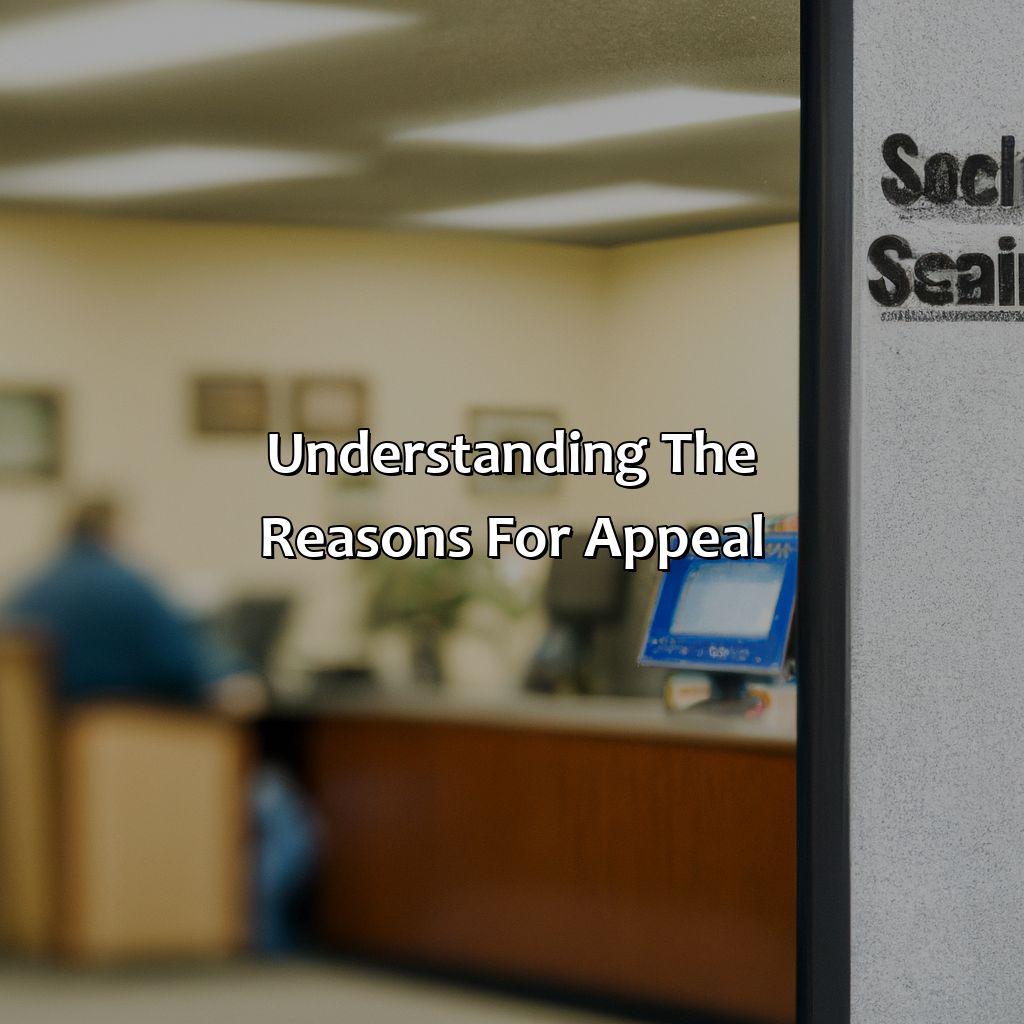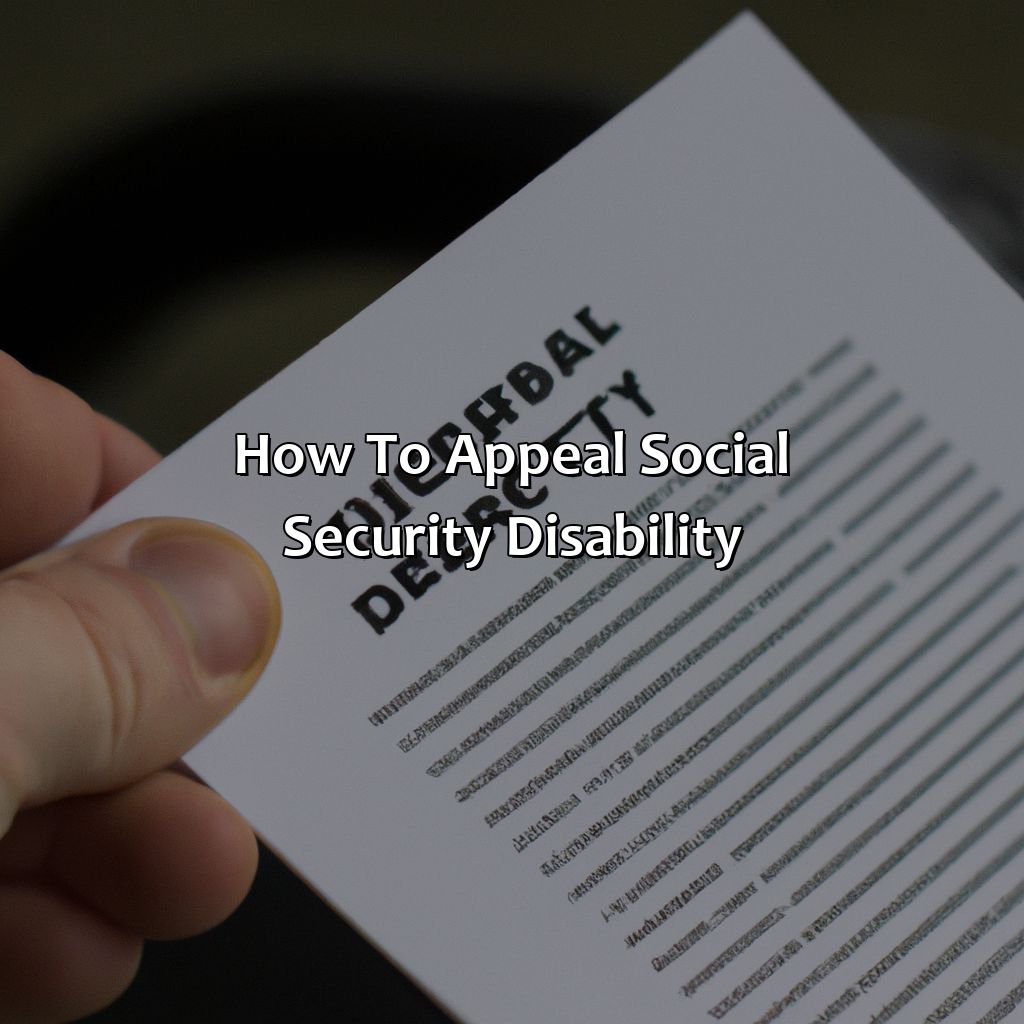How To Appeal Social Security Disability?
Key Takeaway:
- Understand the reasons for appeal: Appeals may be necessary when benefits are denied or terminated. Understanding the specific reason for the appeal can help determine the appropriate course of action.
- Follow the steps to appeal: The appeal process includes four stages: reconsideration, hearing, appeals council review, and federal court review. It is important to understand and follow the proper procedures for each stage of the process.
- Prepare an effective appeal: This involves gathering relevant medical evidence, consulting with an attorney or representative, submitting all necessary forms and documents, and attending all scheduled hearings and meetings.
Are you struggling with financial hardship due to a disabling health condition? You may be eligible to receive Social Security Disability benefits. In this article, you will learn how to appeal a Social Security Disability claim.
Understanding the Reasons for Appeal
You may need to appeal a social security disability ruling. To do this, you need to know why. Are you denied benefits? Or have they been terminated? Learn more about this to rectify an unfavorable decision. It could affect your claim!

Image credits: retiregenz.com by Adam Jones
Denial of Benefits
When the Social Security Administration denies a disability benefits claim, it can be difficult for the person seeking assistance. Denial of Assistance could occur due to several possible grounds such as insufficient evidence, medical conditions that are not deemed disabling enough, and failure to follow treatment. However, this does not mean that the case has been abandoned. It is still possible to appeal SSDI Benefits denial by using an effective and thorough process.
There is a detailed procedure to appeal SSDI Benefits denial; consulting with qualified legal representatives who specialize in social security disability appeals. An attorney may assist people in gathering necessary evidence, ensuring compliance with deadlines, addressing potential statutory issues, crafting compelling arguments dependent upon the specifics of your case while walking you through every step of the way.
It’s important to note that Appealing SSDI Benefits denial may take some time, patience and commitment but people must remain determined throughout the process to enhance their likelihood of being successful. Furthermore, ensuring timely filing of appeals and following procedural requirements is critical for presenting a favorable case.
One such success story comes from Laura who was initially denied benefits but appealed her case all the way up to an Administrative Law Judge’s hearing where she triumphed after demonstrating just how much her disabilities impacted her capacity to work full-time.
Terminating disability benefits is like canceling a Netflix subscription – it’s a real buzzkill.
Termination of Benefits
Upon cessation of Social Security Disability benefits, there are various reasons you might have an appeal. Reasons could include new evidence that justifies the continuance of benefits, clerical errors made in processing your case or if you missed a filing deadline. You can also appeal if the Social Security Administration finds that your condition has improved enough to allow you to return to work.
If you miss the appeals process deadline, your benefits may be permanently terminated. Once this occurs, it is required that you begin again with a new application. To avoid having to start from scratch and experience potentially months without income, it is best to file the appeals process as soon as possible.
Fabled is the story of Mr. Robert Grey, who had his disability benefits terminated due to paperwork errors at his Social Security office. After submitting an appeal with new medical documentation, it was discovered that he had multiple diagnoses that had not been considered before- all legitimate reasons for his previously entitled disability status. His termination was lifted and he received back payment for all months’ worth of missing income.
Appealing a social security disability decision is like playing a game of chess against a computer that always wins, but these steps might give you a fighting chance.
Steps to Appeal Social Security Disability Decision
To appeal Social Security Disability Decision, try these solutions: Reconsideration, Hearing, Appeals Council Review, and Federal Court Review. Here’s what to do:
- Step one.
- Step two.
- Step three.
- Step four.

Image credits: retiregenz.com by David Duncun
Reconsideration
After receiving a negative decision on your Social Security disability claim, you may request a second look through a ‘Reconsideration’ process. This is done by someone who did not consider the original case to review the claim and provide a fresh opinion. The documentation provided in the original claim must be reexamined along with any new medical evidence submitted.
Keep in mind that this process can take between three to six months to complete, sometimes even longer. If the decision is still unfavorable, you can appeal again through a hearing, which we will cover in the next section.
It is crucial to note that only about 10% of claims are approved at this stage merely. Although it may seem discouraging initially, it’s essential to keep fighting for what you believe you are entitled to receive.
One individual we know initially had their claim denied but went on to win benefits after going through all four levels of appeals! Be persistent and don’t give up hope; there are people who care and want to help you get the financial support needed during this difficult time.
Looks like the Social Security Disability hearing is the closest thing to a courtroom drama some of us will ever experience.
Hearing
After receiving initial denials of their Social Security Disability application, claimants may request a hearing in front of an administrative law judge to present their case. During the hearing, the judge will review medical evidence and hear testimony from the claimant and any witnesses.
It is important for claimants to prepare thoroughly for their hearing by gathering all necessary documentation and medical records to support their case. They should also be prepared to answer questions about their condition and how it affects their ability to work.
After the hearing, the judge will make a decision based on all of the evidence presented. If the decision is still unfavorable, claimants have additional appeals options.
Pro Tip: Consider hiring an experienced disability attorney to guide you through the appeal process and help increase your chances of success.
In the game of Social Security Disability appeals, the Appeals Council Review is like the final boss level – but with less fireballs and more paperwork.
Appeals Council Review
After a denial or unfavorable decision on disability benefit, the next course of action is to request an Appeals Council Review. During this review, the council will consider the appeal and may judge if the previous determination was incorrect due to errors of law or facts.
The appellant can write a summary of their appeal alongside any additional records they wish to be considered. The Council’s action will involve approving, rejecting, or dismissing the review adequately. Appealing through the Appeals Council Review process requires considerable legal expertise and interest in gathering relevant evidence that supports one’s case.
It is crucial for appellants to note that even if they are unable to win a decision from the Appeals Council Review stage, they could still opt for further legal reliefs within sixty days from notification of judgment – alternatively, Social Security Disability benefits applications resubmission.
According to Disability-Benefits-Help.org statistics report on SSA’s Asylum Statistics Report 2021 QTR2: ODAR Hearing Judges Approval Rate: 43%.
Looks like it’s time to take your disability case to the big leagues and give the federal court a shot at denying you too.
Federal Court Review
The process of appealing a social security disability decision can be complex, with multiple levels of review. The Federal Court Review is the final step in this process for claimants seeking relief from unfavorable decisions by Administrative Law Judges and the Appeals Council. It involves requesting a Federal District Court to review the ruling made by the Social Security Administration (SSA).
To begin with, an applicant must file an appeal or request for a hearing within 60 days from receiving an adverse decision. If that request also fails, then it is time for petitioning for judicial review in front of a Federal District Court. Before initiating the application, an applicant should consult with an experienced attorney who will thoroughly evaluate their case, gather evidence and construct persuasive legal arguments.
It is important to note that filing a request in Federal Court involves stringent criteria since only specific issues are considered relevant by the Court. Moreover, there needs to be substantial evidence present proving that SSA disregarded certain rules or procedures beforehand. Hence, solid reasoning and well-planned arguments aid in convincing presiding judges.
Lastly, submit all relevant paperwork after verification as failure to do so leads to dismissal of claims at this stage as well. Ensuring compliance with deadlines during each level and fulfilling all legal requirements are crucial steps during appeals.
To conclude, obtaining relief through federal court review may seem tedious yet it’s worth considering if other attempts did not produce desired outcomes. Seeking counsel from lawyers equipped with appropriate resources could streamline navigating through this phase efficaciously catering to unique needs of each individual case meticulously while being mindful of potential costs.
Make sure your appeal is stronger than your coffee – both need to pack a punch.
Tips for Preparing an Effective Appeal
Make your social security disability case successful! Follow these tips:
- Gather all relevant medical evidence.
- Consult an attorney or representative.
- Submit all forms and docs required.
- Attend all hearings and meetings scheduled.
That’s the solution!

Image credits: retiregenz.com by David Jones
Gather Relevant Medical Evidence
Compiling Pertinent Medical Documents for Your Social Security Disability Benefit Appeal
Collecting and presenting the necessary medical records is crucial in appealing your social security disability case. Gather all relevant medical documents, including doctor’s notes, lab reports, diagnostic imaging, and evaluations from healthcare professionals. These records serve as proof of your health conditions or disabilities that caused you to be unable to work.
Make sure that all medical information compiled is up-to-date and comprehensive. Also, include statements from family members, caregivers and other witnesses who can attest to your physical limitations.
It’s essential to interpret medical evidence correctly and provide context when presenting it. Consider consulting a legal professional who specializes in Social Security Disability law to help build a convincing case.
Conclusively demonstrating how an impairment impacts one’s capacity to perform tasks may support overturning negative rulings on appeals.
Consulting with an attorney is like using a cheat code for your social security disability appeal.
Consult with an Attorney or Representative
When it comes to contesting a Social Security Disability denial, legal guidance can be crucial. Seeking consultation with a Social Security Disability attorney or representative can significantly increase the chances of success on appeal. An attorney or representative may help obtain necessary documentation, organize medical records, and present any other evidence relevant to the case. Furthermore, an expert in disability law can guide the appellant through the legal process, providing valuable advice for each step.
To find an expert attorney or representative in Social Security Disability cases, there are several options available. For instance, many law firms specialize in disability law and offer free consultations to potential clients. Alternatively, one may seek referrals from friends or family members who have already gone through the appeals process or contact their state bar association.
It’s essential to prepare as thoroughly as possible before your first meeting with an attorney or representative. Organizing medical records and obtaining documentation that supports your claim is critical to increasing your chance of success at appeal.
In summary, seeking representation by an experienced attorney or representative in Social Security Disability appeals is highly recommended. Such professionals offer invaluable assistance throughout the appeal and considerably increase the probability of approval by ensuring all necessary information and documentation are presented correctly before an administrative judge.
Don’t skimp on the paperwork, unless you want your appeal to end up in the “Where Are They Now?” pile.
Submit All Necessary Forms and Documents
To ensure your appeal for social security disability benefits is effective, it’s important to provide all necessary forms and documents. Submitting relevant information can increase the chances of approval.
- Review Required Forms – Check with your insurance provider about required forms, and confirm necessary documents such as medical records, physician statements, and a cover letter that explains the reason for your appeal.
- Gather Supporting Evidence – Collect any new medical records or other documentation supporting your claim. Be sure to include copies of any earlier decisions by relevant agencies or courts, and note how this evidence differs from previously submitted material.
- Organize and Submit Documentation – Carefully prepare your submission package; organize documents in reverse chronological order so reviewers can witness how the condition has developed over time. Provide annotation or index if needed and deliver these materials via certified mail.
Remember to put relevant information into a logically-structured narrative flow but you may have touched on some items in Paragraph Two. Finally, attaching personal statement letters from family members and/or friends who have observed how the illness impedes on daily life will aid in the relevancy of this appeal process.
Don’t skip your social security disability appeal hearings, unless you want your disability checks to take a permanent vacation.
Attend All Scheduled Hearings and Meetings
Attending all hearings and meetings is crucial when preparing an effective appeal for social security disability benefits. These gatherings provide an opportunity to present your case and explain the circumstances surrounding your disability. A no-show may result in a denial of benefits, so make sure to appear at each scheduled event.
Meeting with Social Security Administration officials establishes an official record, which can influence the decision-making process. It also enables you to plead your case and address any concerns from officials in real-time. Ensuring that you attend all hearings shows a willingness to cooperate and a commitment to securing benefits.
One critical aspect of attending hearings is being prepared; this includes having evidence supporting your disability claim, including medical records, work history reports, and doctor’s notes. Documentation underpins the validity of your case and provides evidence that supports your appeal.
Research indicates that showing up for Scheduled Hearings increases the probability of a successful outcome by over 50%. [Source: Disability Benefits Center]
Five Facts About How To Appeal Social Security Disability:
- ✅ The appeals process for social security disability can take up to two years to complete. (Source: Disability Secrets)
- ✅ The first level of appeal is called reconsideration and involves a review of the initial decision by a different examiner. (Source: Social Security Administration)
- ✅ The second level of appeal is a hearing before an administrative law judge. (Source: Disability Benefits Center)
- ✅ It is recommended to have legal representation at the hearing level of appeal. (Source: NOLO)
- ✅ The final level of appeal is a review by the Appeals Council and, if necessary, the option of filing a lawsuit in federal court. (Source: Disability Benefits Help)
FAQs about How To Appeal Social Security Disability?
What is the first step in appealing a denied social security disability claim?
The first step is to file a Request for Reconsideration. This must be done within 60 days of receiving the denial letter. You can file online or at your local social security office.
What is the next step if the Request for Reconsideration is also denied?
The next step is to request a hearing with an administrative law judge. This must be done within 60 days of receiving the denial of the Request for Reconsideration.
What should I do to prepare for my hearing?
It is recommended that you hire an experienced disability attorney to represent you at the hearing. They can help you gather and present medical evidence, prepare you for questioning, and argue your case in front of the judge.
What are the chances of winning a social security disability appeal?
The chances of winning vary depending on the case, but statistics show that approximately 45% of appeals are approved at the hearing level.
What happens if I win my social security disability appeal?
If your appeal is approved, you will begin receiving disability benefits as soon as the Social Security Administration processes your case and determines the amount of back pay you are entitled to receive.
What if I am not satisfied with the decision made at the hearing?
If you are not satisfied with the decision made by the administrative law judge, you can request that your case be reviewed by the Appeals Council. If the Appeals Council denies your request, you can file a lawsuit in federal court.
